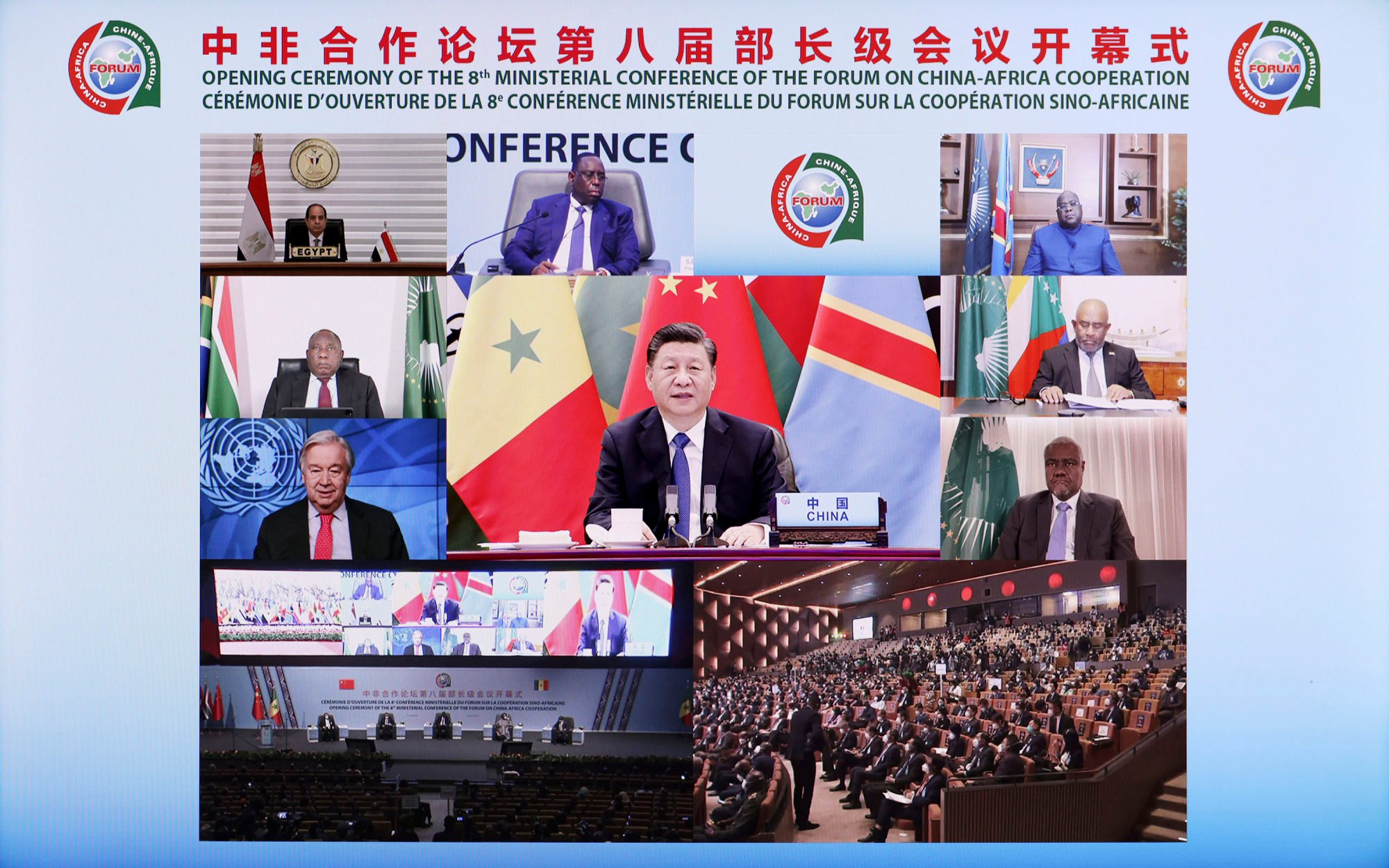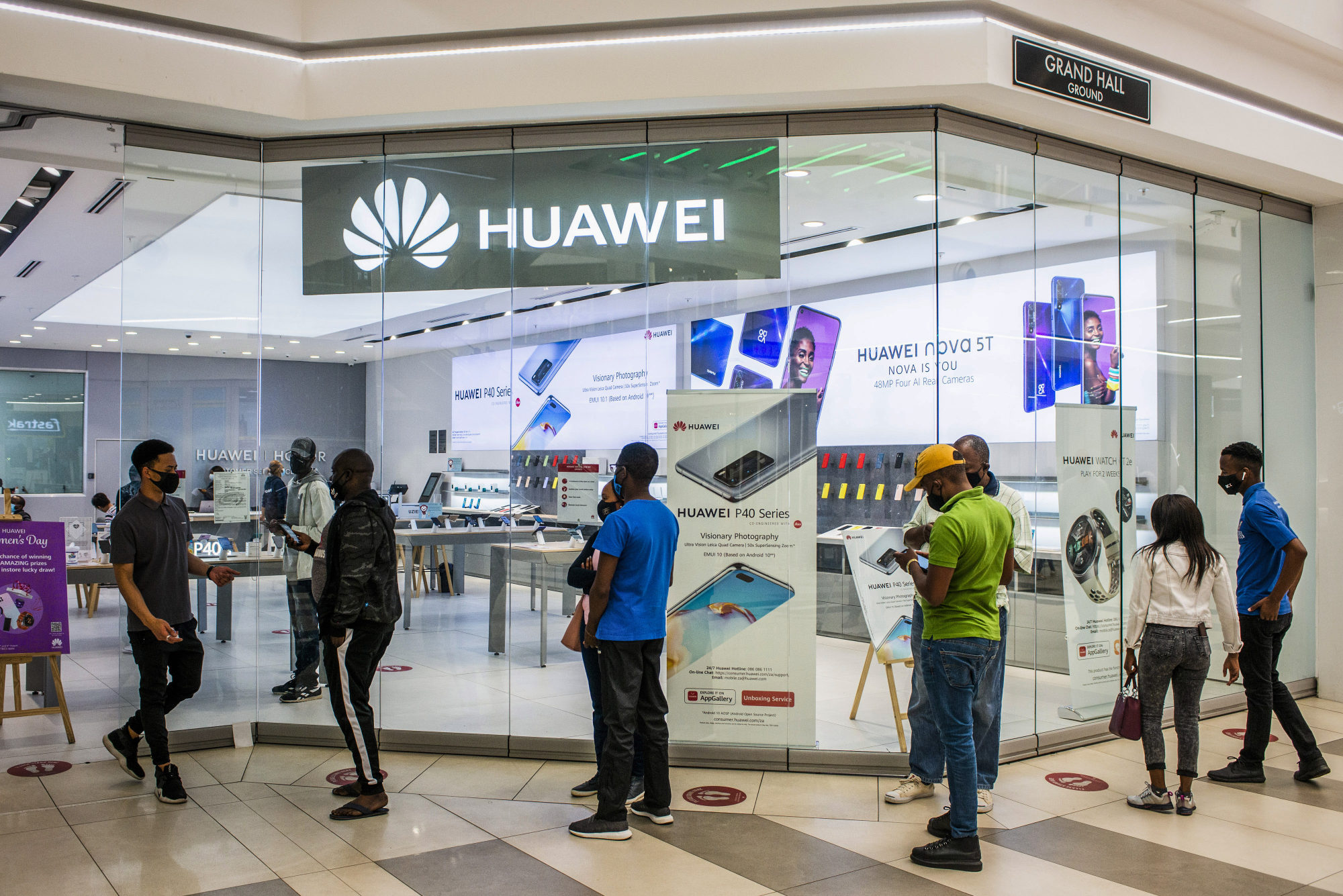
China promotes ‘digital silk road’ as solution to Africa’s data needs
- Huawei and other Chinese companies are building data centres and cloud facilities, as well as installing 5G networks in many countries
- It is estimated 1,000MW capacity and 700 new data centres will be needed to keep pace with Africa’s economic and social transformation
The DSR covers e-commerce, smart cities, undersea fibre optic cables, 5G, data centres, smartphones, internet of things, artificial intelligence, and fintech.
In Dakar, where the forum was held, China is funding and building a data centre to host Senegal’s government data and digital platforms, which will move from servers in the US and Europe.
Senegalese President Macky Sall has said the move will boost his country’s digital sovereignty.

Abhishek Mishra, associate fellow at the Observer Research Foundation in New Delhi, said the Senegal project was important because it was the first time any African country had replicated China’s data governance model.
“The risk is that while Senegal will now control all the information, mimicking a surveillance state, the country’s entire digital infrastructure would be subsequently dependent on Chinese technology,” he said.
“Huawei’s handling of such sensitive information positions China in a place of data superiority.”
Biden signs legislation to tighten US restrictions on Huawei and ZTE
Mishra said the data centre was not the only example of Africa’s move towards a Chinese digital model. In June, Nigeria banned Twitter, drawing parallels with China for the censorship model it is developing.
The Senegal data centre is just one of many being built by Chinese companies in Africa to keep pace with the economic and social transformation which is exerting considerable pressure on the continent’s existing infrastructure, according to Mishra.
The Africa Data Centres Association estimates 1,000MW capacity and 700 new centres will be needed.
Huawei has either completed or is building multimillion-dollar data centres and cloud services in a number of African countries, including Zimbabwe, Zambia, Togo, Tanzania, Mozambique, Mali and Madagascar.
Chinese and US diplomats are jostling for influence in Africa
In a move which could determine control of internet communication infrastructure, Chinese companies – including China Mobile, HMN Tech (formerly Huawei Technologies Co. Marine) and Hengtong Group – are backing construction of two undersea fibre optic cables.
The 15,000km (9,320 miles) Pakistan and East Africa Connecting to Europe (Peace) cable has key landing points in France, Pakistan and Kenya, with plans to extend to South Africa in its second phase.
It is owned by Peace Cable International Network, a subsidiary of Chinese firm Hengtong Group, with equipment supplied by HMN Tech.
Can China’s ‘digital silk road’ secure dominant role in communications?
A second cable – 2Africa – is expected to go live in 2023 or early 2024 and serve the continent and the Middle East. Together, the two cables will offer the fastest communications route between China, Africa, Europe and the Middle East.
The 37,000km 2Africa cable is being built for an estimated US$1 billion by China Mobile International – a subsidiary of the world’s largest mobile phone operator China Mobile – and other mobile operators including MTN GlobalConnect, Orange, and Vodafone.
According to Mishra, two things underline the DSR – the Chinese Communist Party’s view of the digital domain as its next key sector for force projection, and its goal to prevent global digital value chains from being controlled by the West.
“By supporting regional digital infrastructure and projects that integrate the internet, big data and AI, if such projects in Africa are successful in modernising Africa’s various industrial sectors, then it creates a 1.2 billion [people] market for its digital goods and integrates the regional industrial architecture,” he said.
“This is all the more important since e-commerce and fintech are bound to drive national economic trajectories in African countries, particularly as the pandemic has prompted a shift towards digitalisation.”
There is a commercial and strategic logic to the digital belt and road in Africa, according to Eyck Freymann, author of One Belt One Road: Chinese Power Meets the World.
Africa – with its young and fast-growing population, low levels of internet penetration and huge opportunities in areas like fintech, e-commerce and agricultural tech – was recognised by Chinese tech companies as a big potential market for electronics and digital services, he said.
According to Freymann, despite its recent crackdown on Big Tech, China wants to internationalise its technological platforms and experiment with things like cross-border payments using digital renminbi.
Chinese smartphone users lose 1.7 million apps in 3 years
“Africa is an ideal sandbox for Chinese tech firms looking to expand abroad without raising alarms in Washington,” he said.
Analyst Rebecca Arcesati, with the Mercator Institute for China Studies in Berlin, said deepening China’s integration with high-growth digital ecosystems across developing and emerging economies had numerous advantages from Beijing’s viewpoint.
“It is very much in line with China’s economic development and innovation strategy, which aims to turn the country into a hi-tech exporter and global leader in emerging technologies, as well as a rule-maker in the digital economy,” she said.
“Africa is a key market whose technology choices are poised to shape tomorrow’s standards and norms in important ways.”
According to Arcesati, Beijing is executing its strategy by piggybacking off commercial actors. The party-state was also seeking to control more global networks and data flows, leveraging countries’ dependence on Chinese technology to gain geopolitical influence, she said.
“It is no coincidence that Xi Jinping has highlighted the importance of smart city cooperation with African partners for years. The growing integration of the internet of things with urban infrastructure multiplies opportunities for data collection.”
Robert Greene, a non-resident scholar at the Carnegie Endowment for International Peace’s Cyber Policy Initiative and Asia Programme, said Beijing was seeking to play a leading role in standard-setting for cyberspace governance and emerging technologies, including digital currencies.
“For years, Beijing has been trying to project a view of ‘cyber sovereignty’ that is fundamentally at odds with how the US and other democracies conceptualise what the internet should be,” he said.
Xi renews ‘cyber sovereignty’ call at China’s internet event of the year
According to Greene, Beijing’s vision of cyber sovereignty refers to a paradigm in which national governments maintain a significant degree of autonomy, controlling content and governance over cyberspace within their borders.
“Beijing provides direct and indirect support to Chinese technology companies to help facilitate the proliferation of a ‘made in China’ tech stack.”
Greene said Beijing had accelerated efforts in recent years to spread its vision of cyber sovereignty in emerging markets under the banner of the digital silk road.
China’s investments in Africa’s tech is also bound up in its geopolitical rivalry with the US which, along with some of its allies, banned Huawei on security grounds. Huawei rejects Washington’s accusations, including claims it was allowing the Chinese government access to its equipment to spy on voice and data traffic.
“As their governments’ national security concerns push the company away from these markets, the importance of Africa’s developing and emerging economies to Chinese vendors is greater than ever,” she said.
Arcesati said the Huawei issue was not merely a case of an ICT firm reorienting its business strategy following some setbacks.
The company is also China’s national champion and the centrepiece of the government’s plan to achieve global dominance in 5G.
“China’s political and legal system is increasingly fuelling distrust of Chinese technology firms in Europe and elsewhere, a trend that will only deepen with the new data laws and the party-state’s moves to strengthen control over private tech giants,” she said.
“As a result, for Chinese leaders strengthening ties with developing and emerging economies in the digital economy is strategically vital.”

Since the start of the Covid-19 outbreak, China has been stressing digital economy cooperation with its partners in the global South at every virtual major regional summit, from FOCAC to Asean.
“There is a growing focus on promoting normative and regulatory alignment, particularly in the area of data governance,” Arcesati said.
“China sees African countries as essential partners in the creation of a global rule book for the digital economy, one that more closely aligns with its preferences as opposed to a framework written by the West.”
Xi plays up roles for private sector in China-Africa trade and finance
According to Mishra, from the Observer Research Foundation, China’s focus on Africa has also been driven by the setbacks in 5G and communications tech, not just in the US and Europe, but also India – which banned 59 Chinese apps – and Southeast Asia, particularly the Philippines and Vietnam.
“African countries need to ensure they don’t get embroiled between major power rivalries. The political fragmentation and commoditisation of the internet and broadband would be bad news,” he said.
But he added that it was also important to acknowledge the reality that Africa needed these technologies.
“Africa needs network infrastructure, and China is present and is responsible for making 70 per cent of the continent’s network infrastructure. Africans also need affordable handsets and behold, China is making 50 per cent of the continent’s handsets,” Mishra said.
Huawei is Africa’s largest network provider while Transsion, maker of Tecno, Infinix and Itel brands, is the top seller of mobile phone handsets in the continent.


